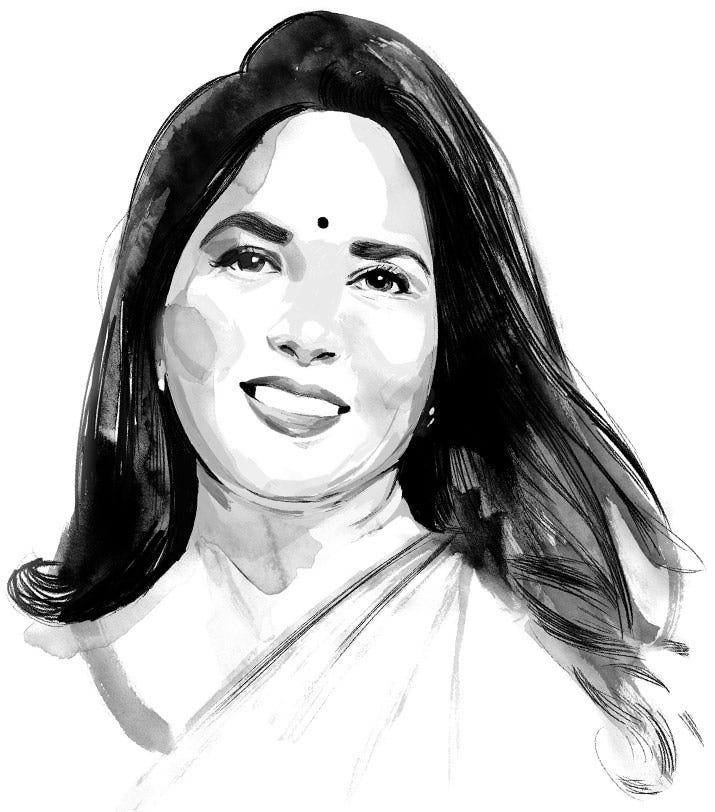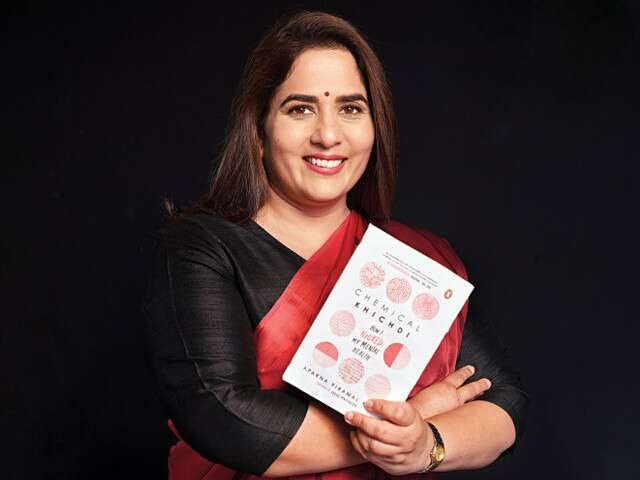Empowering Minds: Aparna Piramal Raje's Impactful Memoir Explores Mental Health and Resilience
Aparna Piramal Raje, a distinguished writer, public speaker, and educator, has recently garnered significant acclaim for her latest book, "Chemical Khichdi: How I Hacked My Mental Health," published in 2022. Combining personal memoir with self-help insights, the book chronicles her arduous journey of grappling with a severe mental health condition over the past two decades. Offering a comprehensive pathway to healing and recovery, it caters not only to individuals facing mental health challenges but also extends support to their caregivers, allies, and mental health professionals. Aparna's profound authenticity and unwavering courage have propelled "Chemical Khichdi" to become a national best-seller, earning her a coveted spot on the AutHer literary awards shortlist while garnering global recognition.
Illustration Credit : Gisela Goppel
Prior to her remarkable foray into mental health literature, Aparna's illustrious career included a lengthy tenure as a columnist for Mint, a prominent Indian business daily, where she curated the enduring column "Head Office." This acclaimed column delved into the multifaceted realm of leadership, seamlessly blending perspectives on workspace design with management workstyles. Through her insightful writings, Aparna featured over 100 CEOs, both from India and around the world, providing an intimate glimpse into their experiences. Her exceptional work on "Head Office" eventually culminated in her first book, "Working Out of the Box: 40 Stories of Leading CEOs," published in 2015. Moreover, Aparna has contributed to esteemed publications such as the Financial Times Weekend in the United Kingdom, further establishing her credibility and expertise.
In addition to her literary pursuits, Aparna serves as a visiting faculty member at Anant National University in Ahmedabad, where she imparts knowledge through a distinctive module titled "Netflix and the Art of Design Writing." Benefiting from her unique background in leadership, design, and mental health, Aparna has emerged as a highly sought-after keynote speaker, captivating audiences with her profound insights.
Aparna Piramal Raje's distinguished career is complemented by her successful tenure as the former CEO of BP Ergo, a renowned modular office furniture company in India. Her exceptional educational background includes studies in politics, philosophy, and economics at Oxford University, followed by an MBA from Harvard Business School, further underscoring her intellectual prowess and business acumen.
Overall, Aparna's accomplishments as a writer, public speaker, educator, and business leader have firmly established her as a prominent figure in the industry. Her groundbreaking work in mental health literature, coupled with her insightful columns, academic contributions, and illustrious career, have made her a true trailblazer in the field, inspiring countless individuals worldwide.
In "Chemical Khichdi: How I Hacked My Mental Health," Aparna Piramal Raje undertakes the important task of debunking myths and misconceptions surrounding mental health-related illnesses, with a specific focus on bipolar disorder. The book serves as a memoir, reportage, and self-help guide, providing readers with insights into the realities of living with a mental health condition.
She shares her personal journey, shedding light on the diagnosis, treatment options, and various strategies she found helpful in managing her bipolar disorder. Throughout the narrative, she weaves in informative facts and figures, offering a broader understanding of mental health issues in India and the importance of early intervention and community awareness. Aparna challenges societal perspectives, emphasizing the need to view mental illnesses within the context of individual-environment interactions. She underscores the significance of seeking professional help, identifying triggers, maintaining routines, and cultivating support systems. The book highlights the essential role of self-compassion, emphasizing the importance of love and understanding towards oneself on the path to treatment and recovery. Overall, "Chemical Khichdi" promotes understanding, hope, and trust, aiming to change the narrative surrounding mental health-related illnesses by providing readers with knowledge, insight, and inspiration to prioritize their mental well-being.
In a candid and insightful conversation, I had the privilege of interviewing Aparna Piramal Raje, delving into her remarkable writing journey and her personal struggle with bipolar disorder. Our discussion explored her experiences, triumphs, and the changes she aspires to bring about in the future through her deeply personal narrative. Raje's introspective journey and her commitment to destigmatize mental health make for an engaging and enlightening exploration of her writing and advocacy.
Excerpts from the Interview :-
Q1) What inspired you to write "Chemical Khichdi’?
Aparna : Writing has always been a profound tool for me to navigate and comprehend the complexities of the world. Around 18 months following my official diagnosis of bipolar disorder, I embarked on a deeply introspective journey and penned a four-page note titled "10 Things I've Learned About Being Bipolar." Intended initially for my close circle of friends, family, mental health professionals, and book club members, this note struck a chord with them. In fact, my book club, recognizing the potential impact of my words, suggested that it could serve as a foundation for a larger narrative—a book—urging me to share my personal story more widely. Their encouragement propelled me forward, igniting the desire to embark on a comprehensive and transformative writing journey that would eventually become my book, "Chemical Khichdi: How I Hacked My Mental Health."
Q2) Could you tell us a little bit about your personal experience with bipolar disorder, and how it influenced your decision to write this book?
Aparna : I’ve lived with bipolarity for 23 years, so it’s hard to summarize it in one para. But in a nutshell – I’ve had extreme mood swings during those times; euphoric highs and damaging lows, interspersed with long periods of months and years of stability and equilibrium. As a writer and a journalist, I wanted to share my story, and I also thought it could help others, as we have very limited mental health literature available in India, especially one that is situated in the Indian context.
Q3) How did you approach writing a book that is part memoir and part self-help guide?
Aparna : It started off being a pure memoir but then over time I felt there were insights and techniques that I had developed that could be more helpful to others than a pure memoir. Also, other very good mental health memoirs were published before mine too, and I didn’t want to replicate what was already out there. My writing club looked at early drafts and helped me refine the structure and turn into a blended book. My writing style relies a lot on structure for coherence of the narrative.
Q4) What do you hope readers will take away from your book?
Aparna : A number of take-aways, I hope. First, that it is possible to live and thrive with a mental health condition, and lead a ‘normal’, fulfilling life. Second, that mental health is a team sport, and there’s a huge role for caregivers, allies and colleagues. Lastly, ‘Chemical Khichdi’ outlines seven therapies that took me from surviving to thriving, and which have helped many readers too.
Q5) How has your experience with bipolar disorder impacted your personal and professional life?
Aparna : It’s been more disruptive of professional life than personal life as I’ve been lucky to have a family that has accepted my condition, and supported me. And by family I mean immediate family, my in-laws, and my extended family. This is a game-changer, as many individuals do not have this support.
But in terms of professional life I’ve had to change my career, from being a CEO of my family business, to being a writer and journalist. This shift is not only because of bipolarity, I think I’m much better suited as a writer than managing a business, but bipolarity exacerbated the work-related stress I experienced as a CEO and led to a profound identity and career shift.
On the positive side, I have now become a professional keynote speaker, after the launch of Chemical Khichdi, which is something I wanted to do. This has only been possible because of bipolarity.
Q6) What kind of research did you do while writing "Chemical Khichdi"?
Aparna : I interviewed approximately 75 people for Chemical Khichdi – those in my ecosystem as well as mental health experts. I wanted to share the perspectives of all those in my ecosystem so that readers could relate to other voices beyond mine – my family and friends, mental health specialists, mentors, colleagues and bosses and more. This is quite unusual for a memoir, and I’ve had many caregivers in particular say how they’ve found this approach useful.
I also read several memoirs and self-help books on mental health, from India and abroad. And finally, I engaged a researcher to help me locate relevant publicly available data to support my arguments.
Q7) In the book, you talk about the importance of support systems. Can you tell us more about that and how it has impacted your own journey with bipolar disorder?
Aparna : As I said earlier, mental health is a team sport. Support systems vary greatly – it starts with family and caregivers but goes much beyond that. I have found that allies – for example mentors, friends and networks – play a different role than family and are very important. Also, colleagues and managers have a game-changing role which is not always talked about. So it is important to create a holistic approach to support.
Sharing my vulnerability, with over 60 people over time, was an important first step in building the support system. Not everyone can support you the way you might like them to, but it’s important to trust them with your vulnerability, and get their insights, and then build a support system.
Q8) How do you think the conversation around mental health has evolved in India over the years?
Aparna : I think we’re having several conversations around mental health in the country, at different stages of evolution. For a large part of the country, the notion that mental health issues are a medical condition, and distinct from personality, is a new one. There is little access to treatment, care or even a basic vocabulary around the different aspects of mental health.
For other parts, there is more awareness, but it is still considered a taboo subject, more than what I had expected when I was writing Chemical Khichdi, to be honest.
And then for some parts of India, especially urban, English speaking youth who are social media savvy, mental health words such as depression, anxiety or OCD are used casually. So I think we are evolving, but we have a long way to go.
Q9) Can you tell us about any challenges you faced while writing and publishing "Chemical Khichdi"?
Aparna : The biggest challenge for me was being sufficiently detached from the material so that I could write about it objectively. I wanted to write the book as far back as 2015 but I kept having mood swings and couldn’t progress on the manuscript. It was only when I started feeling better a few years later that I had the time and distance from the material to approach it with equanimity.
There were also a few sceptics – some friends and mental health professionals – who dissuaded me from writing, and while that did upset me at some points, there were more than enough people who supported me.
Chemical Khichdi has been very well-received so no real challenges on publishing except to say that I wish more corporates would engage on the topic. There has been more hesitation to do so on that front than I would have expected.
Q10. How do you think your book can contribute to reducing the stigma surrounding mental health issues in India?
Aparna : I hope to shape the narrative, discourse and conversation about mental health in India. If I can make a dent in this arena, I will be grateful. If Chemical Khichdi makes it easier for individual to seek care, or for families to have a conversation about mental health, for companies to talk about workplace mental health – these would be signs that it is having impact, and I do know that some of this has happened already.
Q11) What advice would you give to someone who is struggling with a mental health condition, and doesn't know where to turn for help?
Aparna : Seeking professional help (especially a good therapist or a counsellor) is the starting point and it is most important. Chemical Khichdi lists a number of resources in the book, which users can access. Many of these are very affordable. Many people contact me through social media too and I am happy to direct them to mental health professionals too.
Q12) Can you share any particular feedback or response you received from readers of your book?
Aparna : Many responses, but two that struck me the most were from two very different parts of the world. One was from a reader in Maharashtra who said she read the book with the help of a dictionary, because she was a Marathi-medium reader. Two members of her family live with depression, and she felt the book gave her ‘new hope’.
And second, an American middle-aged entrepreneur who came across Chemical Khichdi through a friend and related with it as he is also bipolar, and he felt I was sharing his story! These messages highlight to me how universal mental health challenges are, and how stories can travel across the world.
Q13) What's next for you? Are you working on any new writing projects?
Aparna : I do want to write more books, and have several ideas for nonfiction books, in the mental health space and beyond it. But I also need some time to get back into shape – I’ve been neglecting my physical health. And I’m focusing on building my speaking career, which is quite nascent. I enjoy connecting with audiences through talks and workshops, on leadership, design and mental health. I’m also quite active on social media, especially LinkedIn, Instagram and more recently on YouTube, and want to reach out to the medical community in particular to talk about Chemical Khichdi.
Q14) What kind of impact do you hope your book will have on society at large, in terms of how we talk about and approach mental health issues?
Aparna : To make it easier to discuss these issues in various contexts, at home, with friends, at work. I’ve had talks on mental health in all sorts of spaces – an art gallery, a steel factory, a university. So it’s important that we create the spaces, online and offline, to normalize the conversation.
Also, I want to reiterate how important it is that we have a holistic approach to mental health – the seven therapies in the book. We all have a role to play, even if we are not living with a mental health condition.
Q15) Lastly, what message would you like to give to your readers, and especially those who may be struggling with mental health issues themselves?
Aparna : That there is hope. That it is possible to live and thrive with a mental health condition. But you do need to find ways to hack it – and I hope that these seven therapies give you some ideas on how you can find your own pathway towards a fulfilling existence. I wish you all your best with your journeys and look forward to hearing your stories.
Thank you all for reading and a big thanks to Aparna Piramal Raje for collaborating in today’s post!
It’s a pleasure!
If any of my readers here , wish to know more about the author or her writings. They can follow the links mentioned below :-
Website : https://www.aparnapiramalraje.com/
Instagram : https://www.instagram.com/aparnapiramalraje/
LinkedIn : https://www.linkedin.com/in/aparna-piramal-raje-4752491/
Twitter : https://twitter.com/aparnapraje?lang=en







